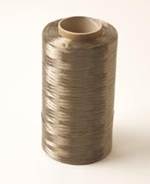Mafic, The Materials Group partner to increase basalt fiber in thermoplastics
The alliance emphasizes basalt fibers’ capabilities as a replacement for existing filled materials and target structural automotive applications.

Photo Credit: Mafic USA
Mafic USA (Shelby, N.C., U.S.) and thermoplastic manufacturer, The Materials Group (TMG; Rockford, Mich., U.S.), announced on August 26 an alliance to increase the use of basalt fiber compounded into injection molded thermoplastics within the automotive industry. Between Mafic’s recent operations at its basalt fiber production facility in Shelby, N.C., and TMG’s work with automotive OEMS and their Tier manufacturing suppliers, the combined expertise will further the overall goal to promote basalt fiber’s good mechanical properties.
A drawn continuous fiber similar to carbon, glass and aramid fibers, basalt fibers both chopped and continuous, are said to provide superior mechanical properties compared to glass fiber for injection molded thermoplastics used in a variety of auto parts. More specifically, note the companies, it offers improved tensile, flexural and impact properties compared to current materials used. In addition, the fiber is said to offer a clear value proposition in nylon resins as a replacement for existing filled materials and can be blended with other fibers.
Moreover, basalt fiber-filled thermoplastics are said to attain an effective balance between cost, performance and sustainability; basalt is said to be more sustainable filler than glass fiber, yielding a 50% reduction in emissions output during manufacturing of the fiber. According to Mafic and TMG, this could eventually lead toward achieving cost, weight and sustainability targets.
Related Content
-
Melker of Sweden accomplishes sea kayak with 100% sustainable composite construction
Built with ampliTex flax fabrics, a solid cork core and plant-based resins, the company’s Värmdö kayak model highlights an environmentally conscious design for paddlers of all levels.
-
Sulapac introduces Sulapac Flow 1.7 to replace PLA, ABS and PP in FDM, FGF
Available as filament and granules for extrusion, new wood composite matches properties yet is compostable, eliminates microplastics and reduces carbon footprint.
-
Optimizing machining for composites: Tool designs, processes and Industry 4.0 systems
Hufschmied moves beyond optimized milling and drilling tools to develop SonicShark inline quality control system and Cutting Edge World cloud platform for optimized tool use and processes.













